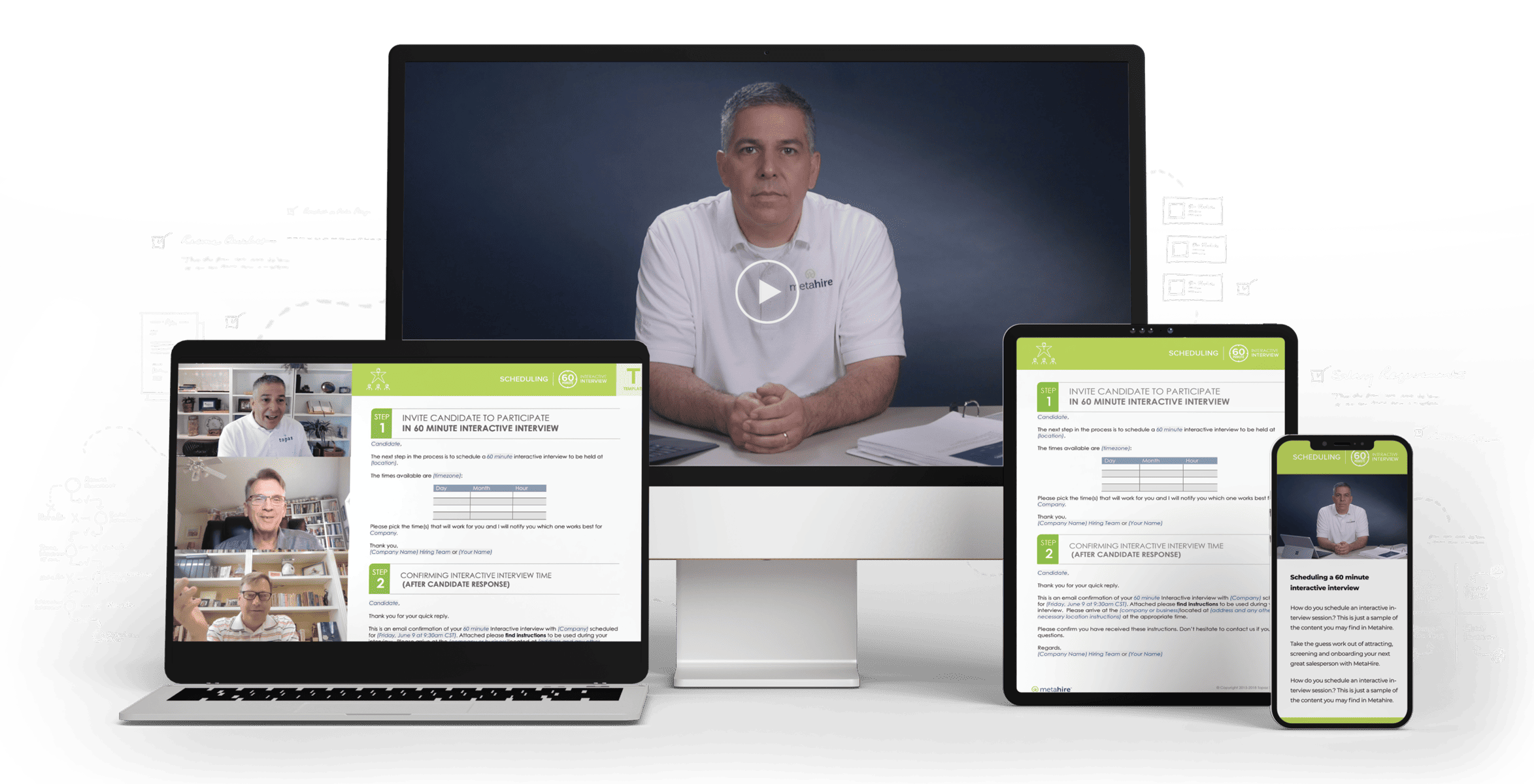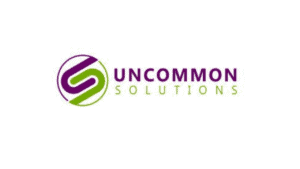Let’s vent together for a minute.
Is it getting exhausting investing time and resources into sales hires who just don’t work out? Have you experienced the frustration of high turnover or the constant struggle to find top talent in a competitive market? Are you finding it difficult to find trustworthy candidates who deliver on their big promises during the interview process?
We’ve been there. So have our clients. It’s hard to find the right people to drive your organization forward.
The tricky part for most companies is that hiring salespeople is often a total gamble — verifying past success and determining if past experience will translate to success in your company is challenging. So, we developed a one-of-a-kind sales hiring system designed to weed out the bad, identify the good, and minimize time and resources lost to bad hires.
We’ve worked with countless clients on their sales hiring strategies and have found that with the right process in place, hiring for sales can go from a company’s most daunting task to one of its most significant strategic advantages.
Think of this quick guide as your go-to cheat sheet for creating an efficient and effective sales hiring process. We’ve broken it down into five key steps that balance strategy with practicality, leaving you with actionable insights at every turn.
Let’s dive in and build the framework for your next great hire.
What Is Sales Hiring?
Sales hiring is the process of identifying, evaluating, and bringing in the right talent for sales-specific roles within your organization. It focuses on finding candidates with the skills, resilience, and adaptability to thrive in roles that demand quick thinking, active listening, and motivation. Sales professionals play a critical role in driving revenue, building relationships, and representing your brand in competitive markets.
What Makes Sales Hiring Unique?
- The Skills Gap: Sales roles often require soft skills like empathy, negotiation, and persuasion, which aren’t easily measured by traditional hiring metrics.
- High Stakes: Every sales hire impacts revenue, making evaluating candidates who can consistently deliver results essential.
- Dynamic Roles: Sales positions vary widely, from account managers to business development reps, each demanding a unique mix of skills, styles, and strategies.
Sales hiring is about finding candidates who can make a measurable impact on your bottom line and thrive in fast-paced selling environments. So why should you care?
Why Is a Distinct Sales Hiring Process Important?
A dedicated sales hiring process is a necessity for growing companies. Sales roles come with unique challenges that require a specialized approach to ensure you’re bringing on the right talent, so general hiring processes often fall short because they’re not tailored to the high-pressure, goal-oriented nature of sales.
Why would you ever want a separate process for sales hiring?
- Sales Drives Revenue: Sales teams are responsible for meeting quotas, closing deals, and directly influencing the bottom line. A poor hire in this role affects team dynamics and impacts your company’s financial performance.
- Mis-Hires Are Costly: Replacing a sales hire can cost up to 200% of their salary when factoring in lost productivity, recruitment expenses, and missed opportunities. Avoiding this requires a process that carefully evaluates candidates beyond surface-level qualifications.
- Sales Tech Constantly Changes: The most successful salespeople tend to be those who are most dynamic, adapting to new tools like CRM systems, automation, and AI to remain competitive. A distinct hiring process ensures you find candidates who can adapt to these changes and bring value in a tech-driven environment.
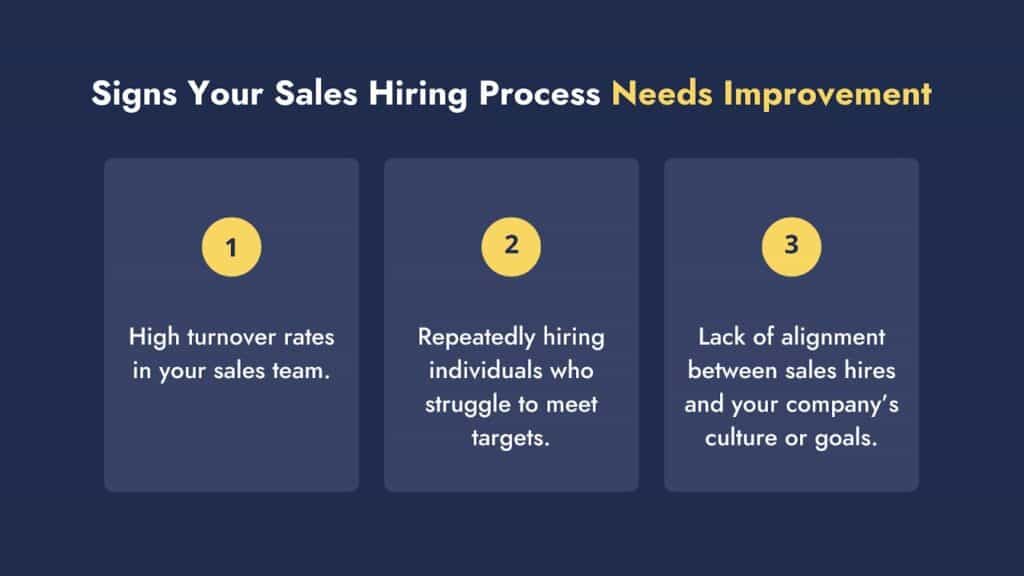
Hopefully, this intro helped you understand why distinguishing your sales hiring process from a traditional hiring process for non-sales roles is a big deal. Now, let’s get into how to set yourself up for success with the perfect sales hiring process.
Step 1: Define the Ideal Candidate Profile
Before hiring top-performing sales talent, you need to know exactly what you’re looking for. Where do you start?
Defining the ideal candidate profile is the foundation of an effective sales hiring process. But it’s easier said than done. Without it, you’re likely to waste time sifting through resumes that don’t align with your needs or interviewing candidates who aren’t a good fit. Or, in the worst-case scenario, you hire the completely wrong person and have to start all over again.
Key Elements to Consider When Defining Your Profile:
- Experience: What level of experience is necessary for the role? Are you looking for someone with a proven track record in closing deals, or are you open to candidates with potential who may need more sales coaching?
- Skills: Does the role require advanced negotiation techniques, nurturing long-term relationships, or expertise in using CRM tools?
- Traits: Sales roles demand specific characteristics such as resilience, adaptability, and self-motivation. These traits often outweigh technical skills when evaluating long-term success.
- Cultural Fit: How well will this person integrate with your existing team and company values? A strong cultural fit ensures smoother onboarding and collaboration.
How to Create the Ideal Candidate Profile
- Audit Top Performers: Review the attributes of your current high-performing sales reps or those of role model salespeople you’ve worked with before. What skills, behaviors, and attitudes make them successful? Think of your past and current clients — what type of people do they connect with best?
- Address Team Gaps: Identify weaknesses in your existing sales team or organization. For example, do you need someone skilled in prospecting or a relationship-builder to balance out the team? Do you need someone more senior to take on more responsibility or someone more junior to handle everyday outreach and administrative tasks?
- Define Metrics for Success: Determine what success looks like in this role — whether it’s exceeding quotas, closing deals in specific industries/verticals, or maintaining a high customer retention rate. These metrics for success will help you determine which questions to ask during your sales hiring process.
- Identify Key Personality Traits: Determine which personality traits align with success in your organization’s sales environment. Be ready to offer a personality evaluation (we love DISC, but there are others). Look for attributes such as resilience, adaptability, and a customer-oriented mindset. Understanding the ideal behavioral traits can help you pinpoint candidates who will thrive in your unique culture.
- Assess Cultural Fit: Develop criteria that reflect your company’s values and mission. Consider how potential candidates align with your team dynamics and organizational ethos. An ideal candidate should possess the necessary skills to succeed in the role, but they should also resonate with the company culture and align with leadership.
Defining your ideal candidate profile ensures that every step of your sales hiring process is focused and intentional. Instead of hoping the right candidate finds you, you’ll actively attract and identify individuals who align with your company’s mission and values.
Step 2: Build a Strategic Recruitment Plan
Once you’ve defined your ideal candidate profile, it’s time to craft a recruitment strategy that attracts the right talent. A scattershot approach to hiring rarely works for sales roles. Instead, we recommend creating a strategic plan to ensure you reach candidates with the skills, mindset, and experience required to succeed in your organization.
Key Components of a Strategic Recruitment Plan:
- Where to Source Candidates:
- Professional Networks: Platforms like LinkedIn are invaluable for identifying active and passive candidates. Use advanced search filters to zero in on specific industries or sales expertise.
- Employee/Network Referrals: Your existing sales team, past or present colleagues, or even your clients may know other talented professionals who fit your needs. Regularly (but politely) ask for referrals to tap into this valuable resource.
- Industry Events: Sales conferences, webinars, and networking events are excellent opportunities to meet qualified candidates.
- Crafting the Job Posting:
- Focus on results: Write job descriptions that emphasize the impact the candidate will make, such as exceeding quotas or penetrating new markets.
- Highlight growth opportunities: Show candidates how they can develop their skills and advance their careers within your company.
- Streamline the Application Process:
- Eliminate unnecessary steps: Overly complex processes can drive away qualified candidates.
- Use pre-screening tools: Leverage online sales hiring assessments to evaluate candidates’ skills and personality fit early in the process.
Here’s a quick side-by-side pro/con list of where you can source candidates:
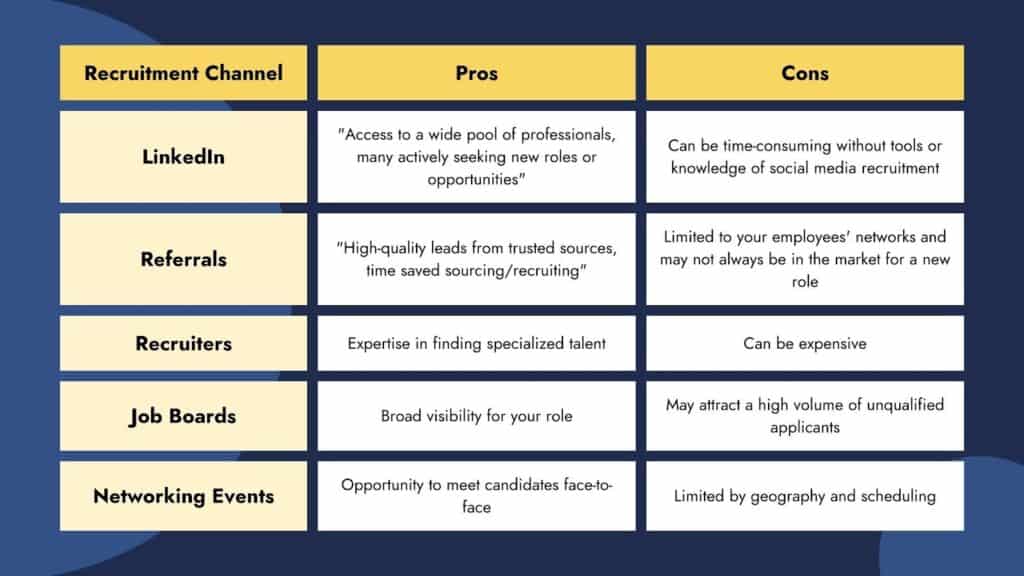
A strategic recruitment plan doesn’t just bring in more candidates — it attracts better candidates. With clear goals, thoughtful sourcing strategies, and a streamlined process, you’ll fill your pipeline with sales talent that meets your needs.
Step 3: Implement a Structured Interview Process
A structured interview process is one of the most powerful tools you can use to hire top-performing salespeople (see this case study as a great example).
While every organization’s approach to interviewing will differ, the benefits of having a consistent, well-thought-out process are undeniable. Without structure, you risk making hiring decisions based on charm and first impressions instead of evidence-based insights. Let’s talk a bit more about the benefits of implementing a structured interview process.
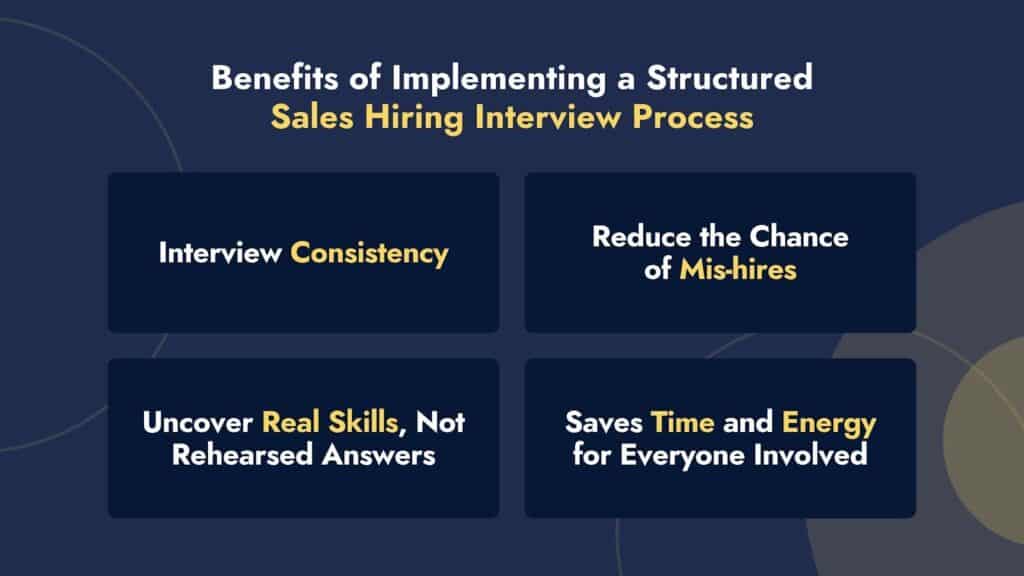
One of the biggest advantages of a structured interview process is consistency. Measuring every candidate against the same criteria eliminates bias and ensures you’re hiring for potential, not personality alone. Instead of leaning on “gut feelings,” you focus on hard data, real examples, and demonstrated skills. In sales roles, flashiness in an interview doesn’t always translate to success in the field. A well-trained sales leader following a consistent process can cut through that noise seamlessly.
A structured approach also allows you to uncover real skills rather than rehearsed answers. It’s easy for candidates to walk into an interview with pre-prepared responses to generic questions like “Tell me about a time you faced a challenge.” However, a structured process asks them to navigate role-specific scenarios that require problem-solving, adaptability, and critical thinking, revealing how they think on their feet — one of the most vital (and, in most cases, unteachable) skills for sales professionals.
Another key benefit is reducing the chance of mis-hires. Without a clear structure, hiring teams often fall into the trap of hiring someone who “seems great” during the interview but doesn’t deliver results on the job. The right process digs deeper, asking candidates to demonstrate behaviors and abilities that matter most in a sales context, such as handling objections, managing their pipeline, interfacing with sales enablement technology, and approaching high-stakes conversations, making it far less likely you’ll end up with a mis-hire who talks a big game but can’t execute when it counts.
Finally, a structured interview process saves time and energy for everyone involved. Instead of backtracking, rescheduling, or debating what makes a “good candidate,” your hiring team follows a clear process from start to finish — and you shouldn’t settle for mediocrity just to fill a seat. With a roadmap in place, you can streamline internal discussions, set clear expectations, and verify that everyone involved in the process knows what to look for. This leads to faster and more successful hires and fewer delays.
Every sales organization will have its unique take on how to structure interviews, and that’s okay. Some teams may use role-play exercises, while others lean into behavioral questions or scenario-based tasks. The key is to create a repeatable process that yields high-quality hires consistently. By moving away from unstructured “let’s just have a conversation” interviews, you’ll end up with a process that saves time, reduces risk, and — most importantly — leads to stronger, more resilient hires.
On the Blog: What is the cost of a bad sales hire?
Mastering the Art of Sales Hiring
Sales hiring is a calculated strategy that separates high-performing sales teams from mediocre ones. While this blog provides a snapshot of key elements like defining candidate profiles, building sales hiring plans, and structuring interviews, we’ve only scratched the surface of what it takes to hire sales talent that consistently drives results.
In reality, sales roles are high-pressure, high-impact, and incredibly dynamic.
Hiring for these positions requires more than a checklist of skills — it demands a process built to evaluate adaptability, resilience, and an innate drive to win. Without a thoughtful and systematic hiring strategy, it’s easy to bring in “good talkers” who underperform when it matters most.
But when you take the time to build a dedicated hiring process, you’re investing in long-term success. By understanding what makes a great sales hire and creating a strategy to identify those traits in candidates, you can build a team of self-motivated, high-achieving salespeople ready to crush their goals.
There’s no one-size-fits-all approach to sales hiring, but there is one constant truth: a thoughtful, well-structured process beats intuition and guesswork every single time.
So, if you’re ready to go beyond gut feelings and start hiring with precision, it’s time to commit to building a sales hiring strategy that works.
FAQs on Sales Hiring
1. What is sales hiring, and how does it differ from general hiring?
Sales hiring focuses on recruiting individuals with specific skills and traits essential for sales roles, such as resilience, adaptability, and strong communication abilities. Unlike general hiring, it emphasizes candidates’ capacity to drive revenue and build client relationships, making a tailored approach crucial.
2. Why is a distinct sales hiring process necessary?
A specialized sales hiring process ensures candidates possess the unique qualities to succeed. This approach reduces turnover, enhances team performance, and directly impacts the company’s bottom line by selecting individuals adept at meeting sales targets.
3. What key qualities should we look for in a sales candidate?
Ideal sales candidates exhibit resilience, adaptability, self-motivation, strong communication skills, and the ability to build relationships. Assessing these traits during the hiring process helps identify individuals likely to excel in sales environments.
4. How can we assess a candidate’s sales potential effectively during interviews?
Utilizing behavioral interview questions, role-playing scenarios, and situational assessments can reveal a candidate’s problem-solving abilities, adaptability, and sales acumen, providing a comprehensive view of their potential.
5. What are common pitfalls in the sales hiring process?
Relying solely on gut instincts, neglecting to define clear candidate profiles, and lacking a structured interview process can lead to mis-hires. Implementing a systematic approach mitigates these risks.
6. How does a structured sales hiring process benefit our organization?
It ensures consistency, reduces biases, and aligns hiring practices with organizational goals, leading to a more competent and cohesive sales team.
7. How can we improve retention among sales hires?
Providing ongoing training, clear career progression paths, and fostering a supportive work environment enhances job satisfaction and reduces turnover among sales professionals.

